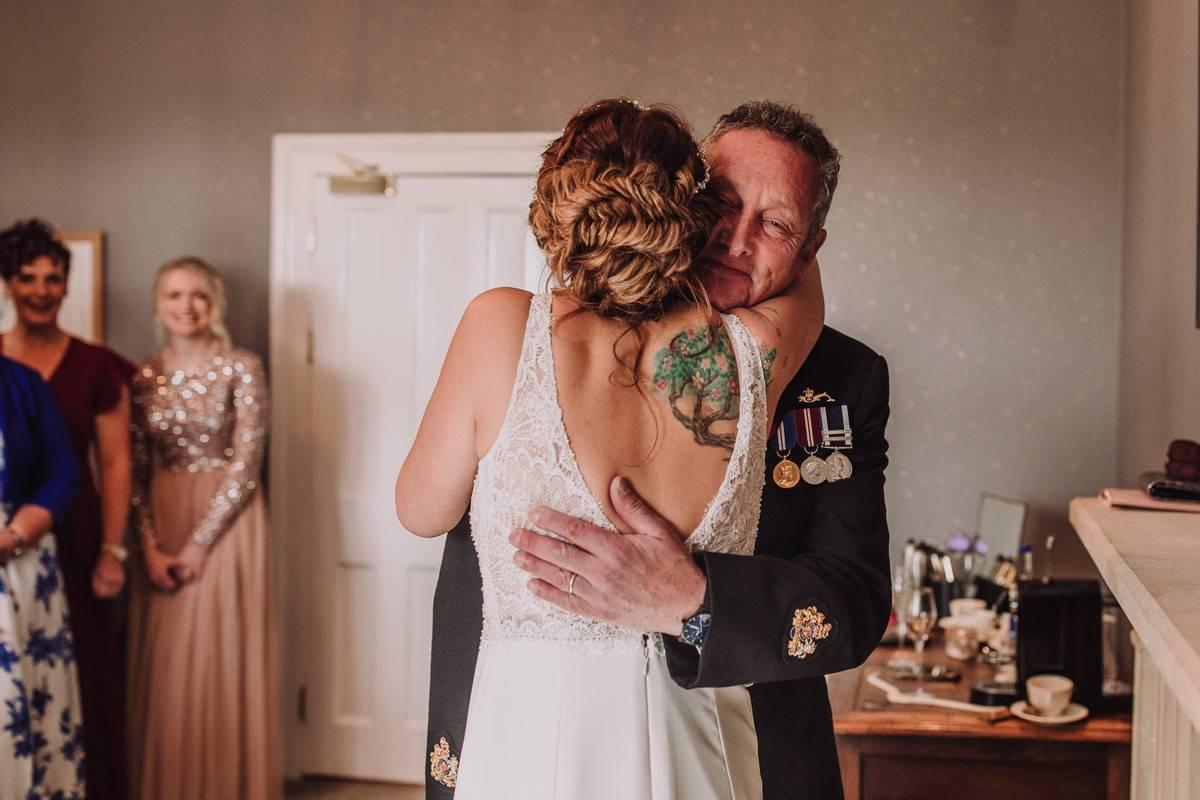How to Handle Feeling Left Out of Your Son or Daughter's Wedding Planning
Feeling left out of your child's wedding planning? We asked a relationship counsellor how to handle feeling left out of your son or daughter's wedding sensitively and carefully

Planning a wedding can be a bit of an intense time - and it can be even more challenging if you’re desperate to help out but don’t know how. Each couple approaches wedding planning in their own way, but if you’re the parent of a bride or groom and you’re feeling excluded from the wedding planning process, here’s how to handle it.
It’s important to manage your expectations and understand what your son or daughter wants, and how they approach planning. You might have been dreaming of a fairy tale wedding for them for years, but if they want something more casual, then you need to adjust your expectations. Likewise, if they like to work independently, getting involved in the planning might feel challenging. We asked Relate counsellor Peter Saddington for his top tips on navigating this tricky area in family life.
How Do I Broach the Subject of Feeling Left Out of My Son or Daughter’s Wedding?
Peter has three key tips for parents who feel left out of the wedding planning process and want to tactfully bring it up. Firstly, he advises: “Watch your ‘shoulds’ and ‘shouldn’ts’. Unless you honestly believe you have the right to take the moral high ground and preach to your child. Undoubtedly in life, there are things we all ‘should’ and ‘shouldn’t’ do - like we should eat a healthy diet and not murder anyone.
“Rather than inviting an ethical debate, try saying ‘I’d like you to…’ or ‘I think it would be good to…’, instead of ‘you should’ or ‘we should’.”
Once you’ve mastered the art of altering your language - saying ‘I would like to be more involved’ will come across way better than ‘I should be involved’ - Peter advises you to also consider your emotions.
“Stay calm,” Peter recommends. “When people get angry, reason tends to go straight out of the window.” You might feel angry that you’ve been left out of decisions, or be cross about your lack of involvement in the planning so far. If that’s the case, there are some things you can do to calm yourself down before you discuss it.
“The best way to stay calm is to control what’s going on in your body. Make sure you sit in a comfy chair where you can keep your muscles relaxed, breathe deeply and if necessary, count to 10 before you start each sentence,” says Peter.

“Not only will this help to keep you chilled but it will also ensure that your child doesn’t feel intimidated. If your temper is beginning to rise then stop the conversation immediately. Being angry and expressing your anger is ok, but if one or both of you is going to lose their cool to the point where they say something they’ll regret, then it’s time to call it a day and reconvene when you’re calm again.”
Finally, Peter suggests talking about your feelings as well as your thoughts: “Saying that you feel unvalued when they did not invite you , unloved when they included other rather than you, and hurt because you thought you had a good relationship explains not just what the problem is, but the effect the problem is having on you.” By doing this you avoid sounding critical and are actually explaining the emotional impact the situation has on you. This should lead to a more effective conversation.
READ MORE: The 21 Things That Didn't Matter to Couples on Their Wedding Day
How Can I Improve Communication With My Son or Daughter?
If you are struggling to communicate that you feel left out of their wedding, there are a few ways to address this.
Peter recommends reminding yourself that your child is an adult in their own right: “They do not have to agree with you or take your advice - so if they start disagreeing or objecting it is important not to hold onto the idea that as they are your child, they have to do what you are saying.”
There are also a few things to think about when starting the discussion:
- Define your objective
- Don’t start sentences with ‘you’
- Stick to the subject
- Listen actively
- Watch those ‘shoulds’ and ‘shouldn’ts’
- Don’t interrupt
- No subtle sabotage
Some of those points will be easy to observe in a conversation with your son or daughter about their wedding planning. By defining your objective, i.e. your involvement in their wedding planning, it will be easier for you to reach a conclusion. Peter says: “Before you open your mouth, make sure you know why you’re doing it. No communication will be effective unless you know what it is you’re hoping to achieve by it.
“Do you want to express your opinion? Discover how your child thinks and feels about something? Negotiate a compromise on a tricky issue? Discuss ideas to improve your relationship? Or, if you’re really honest with yourself, do you just want to let off steam about something? It really doesn’t matter what your objective is, as long as you have one and you’re open and honest about it. If you want your conversation to effectively reach a goal then you first need to define it and then share it with them.”
When it comes to starting your sentences, one small tweak will make a world of difference: “It’s amazing how much smoother a conversation can be when you make a few subtle changes to your language. Starting a sentence with ‘You’ always points a blaming finger and invites a counter attack. Whereas starting with ‘I’ makes it clear that you’re stating your opinion, not a fact and you’re owning your feelings rather than blaming something.
“For example, ‘I’d like you to talk to me about what you want us to do in preparing for the wedding’ states a very clear request by you. Whereas saying ‘You do never say what you want us to do’ is accusatory and gives no indication of the change that you require.”

It seems obvious to not interrupt, but as Peter says, “for some reason politeness often flies out of the window when we talk to our families or children.”
Finally - avoid subtle sabotage. “There are so many subtle ways of sabotaging a conversation,” explains Peter. “Showing boredom or contempt by eye rolling, arm folding or yawning. Going silent or expecting mind reading. Launching into a one sided monologue, repeating yourself, becoming sarcastic or belligerent. Bursting into tears or using some other form of emotional blackmail to take control of the conversation. If you want your conversations to be effective then make note of the subtle ways you try to manipulate what’s going on to your favour – and STOP IT.”
READ MORE: Your Complete Wedding Planning Checklist
Talking to My Child About Their Wedding Planning is a Sensitive Subject - How Can I Approach It in a Delicate Manner?
It all comes down to your timing, says Peter: “Pick the time - not when the other person is stressed, worried or engaged in something else.Try to give some notice - ‘is it possible to talk to you later/tomorrow/tonight’ or ‘when would be a good chance to talk something through with you?’.
“Remember if it is delicate/difficult you are more likely to have a better outcome if it is not sprung upon the other person.”
He also advises to be conscious of your environment: “Try not to have the conversation when there are other people there. If it is delicate, it is more likely that the other person will listen to you if they are not having to concentrate on how other people are responding.
“You can also use your ‘I’ statements: ‘I am not sure if inviting so-and-so is such a good idea, because (for example) I remember when s(he) went to another wedding there was a big argument that upset the bride’.”
READ MORE: Wedding Roles Explained
How Can I Show That I Support My Son or Daughter as They Plan Their Wedding Without Overstepping?
“It's not easy to manage because it is their day, but there will be a huge amount of anxiety around so it can often be interpreted that the parent(s) are interfering or being controlling when making suggestions or wanting to be involved,” says Peter.

“Anxiety will go up and down so don't be surprised if you get a negative response the first time around.Try really hard not to take it personally and if you think it is something that is important try again on another occasion - remember the more you push something the more resistance you will meet.”
Modifying your language to soften your approach will really help: “Try and avoid statements that start with ‘You’, like, ‘You need to get this done’. Empathy will really help - try: ‘It sounds like it is really hard to sort all of this’, or ‘it sounds really stressful for you’.
“It’s also helpful to normalise things - lots of couples worry about making the right decisions, so if you experienced that, talk about how you felt when you got married. Remind them that it is a big day and it’s normal to feel anxious about everything going right.”
Hopefully these tips will help you to open up to your son or daughter as they plan their wedding and improve communication. If you are looking for more ways to help with wedding planning, don’t miss our list of mother of the bride duties.








